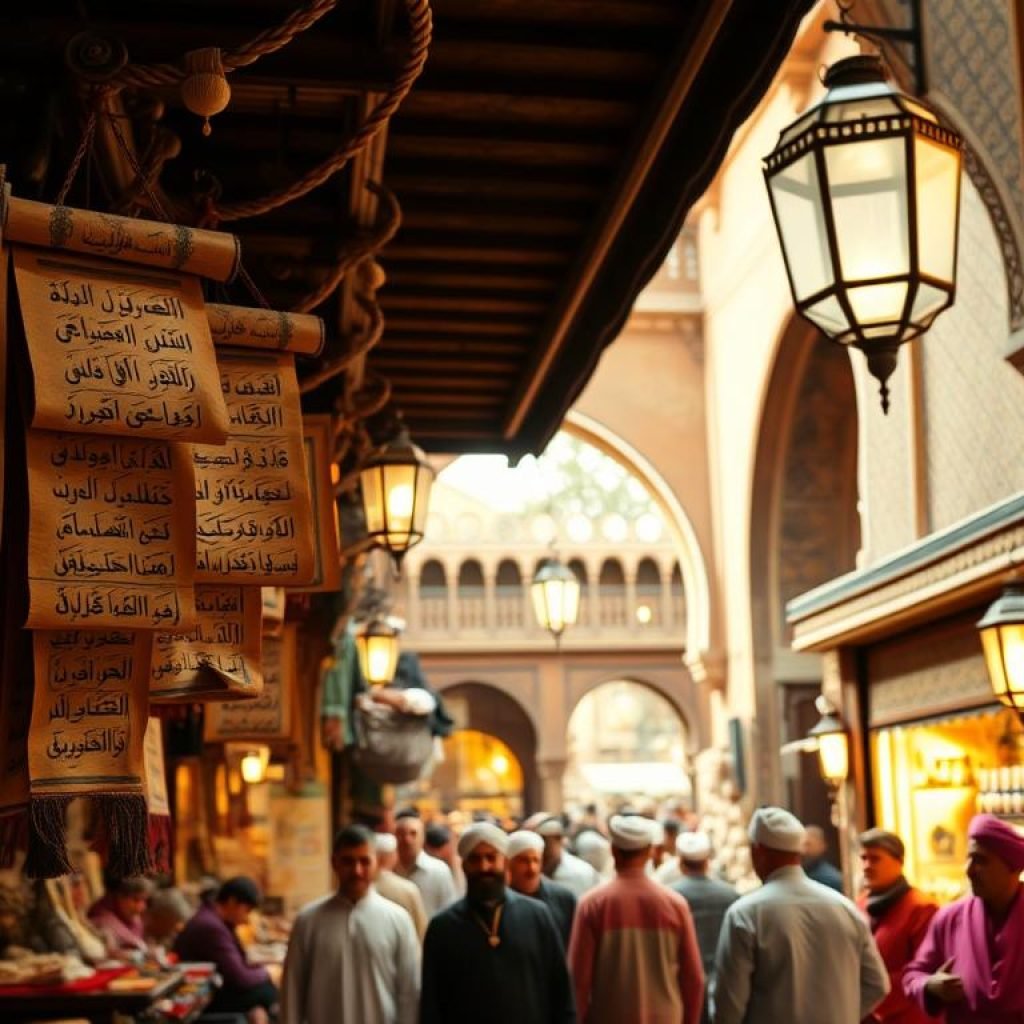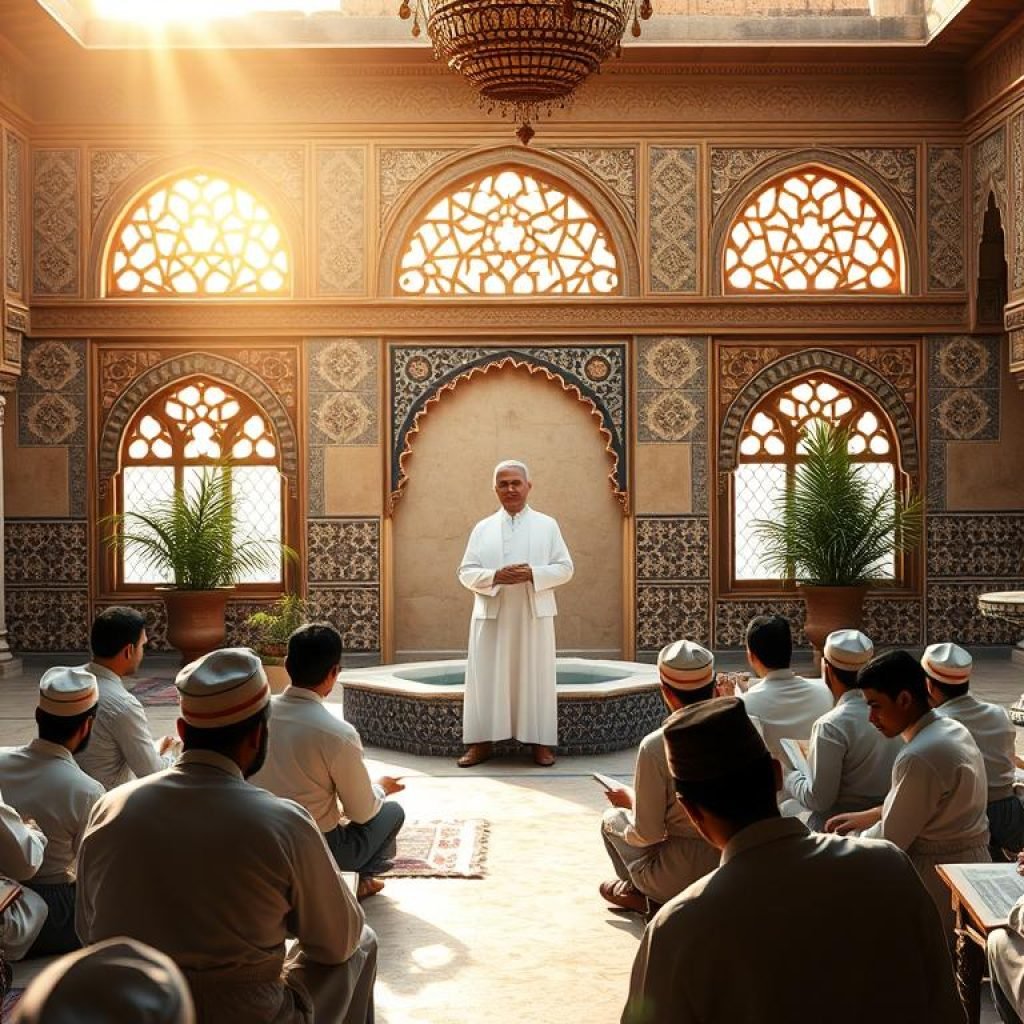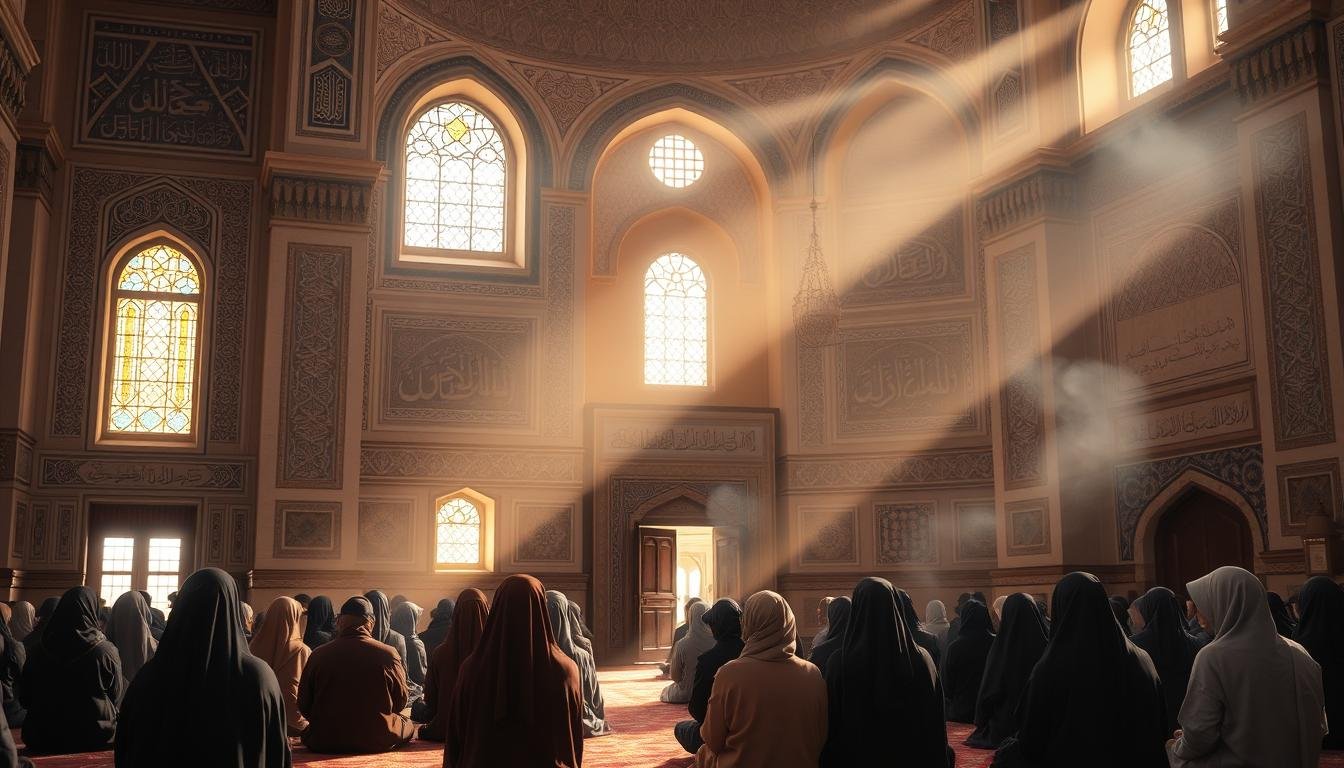Islam plays a big role in the daily lives of Moroccans. The country’s rich history in Islamic scholarship and education shapes its culture and traditions. Understanding Moroccan Arabic phrases and dialect expressions is key to grasping everyday life.
For example, learning about Al-Qaraouiyine University in Fes, founded in 859, offers insights into Islamic education. You can dive deeper into Morocco’s history and culture by visiting Moroccan travel tips and exploring vibrant cities.
Key Takeaways
- Morocco has a long history of Islamic scholarship and education, with institutions like Al-Qaraouiyine University in Fes playing a significant role.
- The country’s Muslim majority population, with approximately 99% of its population identifying as Muslim, has a profound impact on its culture and traditions.
- Moroccan Arabic phrases and dialect expressions are essential to understanding the country’s rich cultural heritage.
- The call to prayer is recited five times a day across all mosques in Morocco, reflecting the importance of Islamic practices in daily life.
- The integration of Quranic stories into academic discussions at universities like Mohammed V University highlights the significance of Islamic education in Morocco.
- The Moroccan government has implemented various reforms to promote a moderate and tolerant form of Islam, including educational reforms and counter-terrorism strategies.
- The country’s history, including the rule of dynasties like the Almoravid and Almohad, has shaped its unique cultural identity and Islamic practices.
Overview of Islam’s Influence in Morocco
Islam deeply influences Moroccan society, with over 99% of people following it. To really get Moroccan culture, it’s key to Learn Moroccan Arabic and know Essential Moroccan Arabic phrases. This knowledge makes your trip better and helps you appreciate Morocco’s rich history.
Morocco’s history is shaped by Islamic dynasties like the Almoravids and Almohads. The Almoravids united Morocco and expanded it from 1040 to 1147. They reached West Africa, Spain, and Algeria. The Almohads, ruling from 1121 to 1269, made Sunni Islam the main belief in Morocco.
Now, Morocco’s government supports a moderate Islam. The king is seen as the leader of the faithful. They’ve started a program with 100,000 imams to spread moderate Islam in 50,000 mosques. Knowing about Islam in Morocco helps visitors understand the country’s customs and traditions.
Moroccan Islam values prayer, charity, and community. By Learn Moroccan Arabic and talking to locals, you’ll see Morocco’s famous hospitality. Whether you’re in Marrakech’s busy streets or a quiet riad, knowing about Islam makes your trip unforgettable.
The Five Pillars of Islam in Daily Life
In Morocco, the Five Pillars of Islam are key in daily life. They shape the spiritual and social practices of Muslims. Knowing Moroccan Arabic vocabulary and Common Moroccan Arabic phrases helps us understand the culture and religion of the country. These pillars include declaring faith, praying, giving to charity, fasting, and making a pilgrimage.
Prayer, or Salah, is a big part of daily life. Muslims must pray five times a day. Fasting during Ramadan is also important. It means not eating or drinking from dawn to dusk for about 29 to 30 days.
Almsgiving, or Zakat, is another key practice. It involves giving some of your wealth to help the Islamic community.

- Over 90% of Muslims see the Five Pillars as essential to their faith and daily life.
- Zakat helps give around $600 billion each year to charity, thanks to Muslims worldwide.
- About 50% of Muslims say Salah keeps them spiritually connected and well.
The Significance of Friday Prayers
Friday is a special day for prayer in Islam. Prophet Muhammad said it’s like praying and fasting for a whole year. In Morocco, many people try to go to Friday prayers. It’s common for them to take the day off to be with their families. Learning Moroccan Arabic greetings and Moroccan slang phrases can help you understand its importance.
In Morocco, Friday prayers are key to the community’s life. Millions go to mosques to hear sermons. The day also includes a traditional lunch of couscous, a beloved dish. Knowing some Moroccan Arabic greetings and phrases can help you connect with the locals.
- Gathering at mosques for communal prayers
- Listening to sermons and guidance lessons
- Spending time with family and engaging in communal activities
- Exchanging Moroccan slang phrases and greetings with locals
By going to Friday prayers and joining the community, you can learn more about Moroccan culture. You might even pick up some Moroccan Arabic greetings and phrases to make your experience richer.
Ramadan Celebrations and Traditions
Ramadan is a big deal for Muslims in Morocco. It’s filled with celebrations and traditions. To really get into these customs, learning Moroccan Arabic language and how to speak Moroccan Arabic is key. It lets you connect with locals and dive into the culture.
Before Ramadan starts, Moroccans get ready by buying or making new djellabas. They also make lots of sweets like sellou and chebekia. During Ramadan, people fast from dawn till dusk. The Iftar meal, with dates, milk, and traditional dishes, is a big part of their day.
Some important Ramadan traditions and celebrations include:
- Iftar and Suhoor: breaking the fast and preparing for the next day
- Tarawih prayers: extra prayers performed at night
- Laylat al-Qadr: a night of significant religious importance
- Eid al-Fitr: a celebration marking the end of Ramadan
By taking part in these traditions, you can really understand Moroccan culture and Ramadan’s importance. Whether you want to learn how to speak Moroccan Arabic or just experience local customs, Ramadan is a great time. It’s a chance to connect with the community and make unforgettable memories.
Islamic Education and Learning
In Morocco, Islamic education has changed a lot over 50 years. More kids are going to public school now. This change has made traditional Islamic schools, called Qur’ānic kuttābs, mix old values with new learning. This mix attracts parents and helps students get better jobs.
The Moroccan Arabic culture and traditions shape the country’s schools. Since the 18th century, Islam has been a big part of education. The Moroccan Ministry of National Education shows how Islamic learning fits into the whole school system. 
Some important parts of Islamic education in Morocco are:
- Introducing new ideas in traditional Islamic schools to draw in parents
- Mixing old values and culture with modern learning
- Helping students get better jobs
- Putting Islamic education into the whole school plan
The Moroccan Arabic culture deeply affects the country’s schools. It focuses on keeping traditional values and customs alive. By understanding this culture, we see how Morocco uniquely teaches Islamic education and learning.
The Influence of Islamic Festivals
Islamic festivals are key in Moroccan Arabic history and customs. They shape the country’s culture. About 98.7% of Morocco’s people are Muslims, mostly Sunni Islam followers. The call to prayer happens five times a day, marking important moments for Moroccan Muslims.
The Five Pillars of Islam are crucial for most Moroccan Muslims. Daily prayers (Salāt) are performed five times a day. Zakāt, or almsgiving, is seen as a 10% income tax, still common in Moroccan society. Ramadan, lasting a month, changes daily routines and brings people together.
Some important Islamic festivals in Morocco include:
- Eid al-Fitr, marking Ramadan’s end, brings family and traditional celebrations together.
- Eid al-Adha, or the Festival of Sacrifice, is celebrated over four days.
Knowing about Moroccan Arabic history and customs helps us understand these festivals’ importance. By looking into state Islam in Morocco, we see its role in education, politics, and religion. This gives us a deeper look into Morocco’s rich cultural heritage.
Women in Islam within Moroccan Society
In Moroccan society, women are key in keeping cultural traditions alive. They prepare Moroccan Arabic food and celebrate Islamic holidays. The Moroccan Arabic cuisine is loved for its taste and for bringing people together.
Women in Morocco face many challenges, like limited education and job opportunities. But, there are efforts to make things better and promote equality.
There are programs to help women get educated and find jobs. Campaigns also raise awareness about women’s rights. Supporting these efforts can make Moroccan society fairer for everyone.
It’s also important to value Moroccan Arabic cuisine in Moroccan culture. Sharing meals and traditions helps us understand and appreciate Morocco’s rich heritage.
The Relationship Between Islam and Moroccan Culture
Moroccan culture is deeply connected to Islam. This bond is seen in many parts of Moroccan life. From Islamic architecture to Moroccan Arabic art, Islam’s influence is clear. Moroccan Arabic music, blending old and new styles, is also a big part of their cultural heritage.
The Moroccan monarchy has helped spread a moderate and tolerant Islam. This has made Morocco’s culture rich and diverse. The king’s role as “Commander of the Faithful” shows the link between religion and politics.
Some key aspects of Moroccan culture influenced by Islam include:
* Islamic calligraphy and geometric patterns in art and architecture
* The importance of hospitality and respect for guests
* The celebration of Islamic festivals such as Eid al-Fitr and Eid al-Adha
* The role of Moroccan Arabic music in traditional and modern cultural events
The bond between Islam and Moroccan culture is complex and rich. It shows Morocco’s unique history, traditions, and values. By looking into this relationship, we can understand Moroccan society and its rich cultural heritage better.
| Aspect of Moroccan Culture | Influence of Islam |
|---|---|
| Art and Architecture | Islamic calligraphy, geometric patterns |
| Music | Moroccan Arabic music, traditional and modern styles |
| Festivals and Celebrations | Eid al-Fitr, Eid al-Adha, other Islamic festivals |
Interfaith Dialogue in Morocco
In Morocco, people from different faiths come together to understand and accept each other. Moroccan Arabic literature and Moroccan Arabic poetry help in this effort. They give a voice to people’s thoughts and feelings about their faith and culture.
Morocco is known for its tolerance and acceptance. People from various religious backgrounds live together peacefully. The Marrakech Declaration is a key example. It gathers Muslim scholars and interfaith leaders to support human rights for all.
The Mercer University program is a great example of interfaith work in Morocco. It brings students from different faiths together. They participate in discussions and activities that foster understanding and acceptance.
Challenges Facing Islam in Contemporary Morocco
Islam in Morocco is facing many challenges today. Modernization and secularism are changing traditional practices. The Moroccan government is working to promote a moderate Islam. This is shown in the Moroccan Arabic education system.
This system teaches students about Islamic values and principles. It also encourages critical thinking and curiosity.
Engaging young people in Islam is a big challenge. Many young Moroccans are interested in Moroccan Arabic schools and modern Islamic teachings. But, there are worries about extremist influences, especially in cities.
The Moroccan government has started many initiatives to tackle these issues. They aim to promote religious tolerance and fight extremism. These efforts have helped people understand Islam better and have made society more inclusive.
Some important initiatives include:
- Setting up places for imams and religious leaders to get training
- Creating educational programs that encourage critical thinking and curiosity
- Supporting community events to build unity and social cohesion
The Future of Islam in Moroccan Society
As Morocco moves into the 21st century, Islam’s role in society is changing. The country’s media and news outlets are key in showing and shaping views on Islam’s future. They play a big part in the public’s understanding and discussion of Islam in Morocco.
The recent elections, like the 2021 ones, show a shift towards modernity and secularism. Yet, Sufism’s lasting impact and the government’s push for a moderate Islam suggest a mix of old and new. This mix will likely shape Morocco’s religious scene for years.
Technology and social media will also play a big role. Young people’s views on Islam might change as they use online platforms more. This could change how people talk about and practice Islam in Morocco.
Despite the ups and downs, one thing is clear. Islam’s strong tie to Moroccan identity will keep defining the nation’s culture and society. This will guide Morocco’s path into the future.




Comment (0)